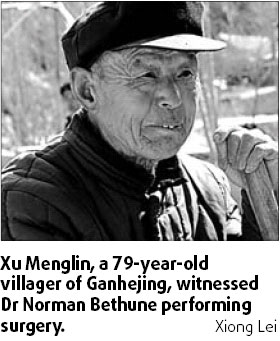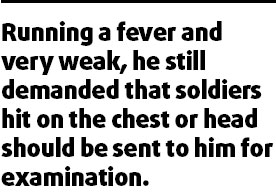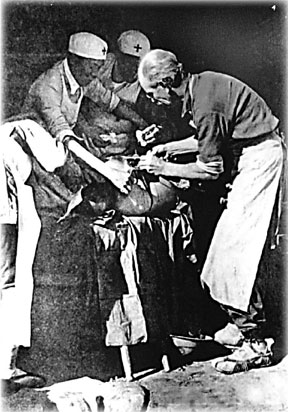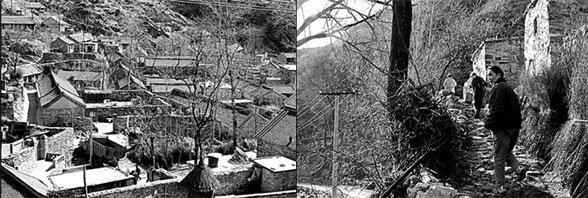Doctor divine
When asked by some visitors if he knew about Canadian Dr Norman Bethune, Xu Menglin, a 79-year-old farmer in a remote mountain village of Hebei in North China, asks: "Have you ever met him?"
Of course not, they answer as the oldest of the visitors was not born until eight years after the Canadian doctor died in China in November 1939.
|
Dr Bethune perfoms surgery in a small temple less than 9 km away from the frontline at Sunjiazhuang village, Laiyuan county of Hebei on Oct 28, 1939. Wu Yinxian |
Xu then proudly says that he saw Dr Bethune as a child. In fact, his village, Ganhejing (meaning a dried up sweet river) in Yixian county of western Hebei, is one of the places where the doctor spent his last days nearly 70 years ago.
Holding up the spade he was working with over his head, Xu says: "Dr Bethune was about this height, very tall!" And he vividly remembers the doctor "had brown hair, was balding and had a hooked nose".
Xu says he even watched Dr Bethune perform open-head surgery on wounded soldiers of the Eighth Route Army in the resistance against the invading Japanese.
"They tried to chase us away but we just remained outside the surgery room and could see everything through the window," says Xu.
The surgery was but a make-shift set-up in a farmhouse, similar to every other clay and rock building in the village.
With Dr Bethune's coming, the mountain-locked community saw electricity for the first time. "They brought along a motor and could generate electricity," Xu says.
A four-hour car ride to the southwest of Beijing, Ganhejing was part of the anti-Japanese base known as the Shanxi-Chahar-Hebei border area during the anti-Japanese war and was home to a medical center under the Eighth Route Army in the late 1930s.
Ahead of the first national holiday of Qingming Festival, the traditional Chinese Tomb-Sweeping Day, which falls on Friday, a group of visitors paid tribute to the Canadian doctor at the villages where he kept on saving Chinese soldiers during the last 10 days of his life.
You Liqing, one of the visitors, knows the village better than most, even though it was her first time in Ganhejing. Back in the late 1930s, her late father You Shenghua was deputy health minister of the border area and had worked with Bethune.
"It was my father's lifelong regret that he did not follow Dr Bethune on this inspection tour of the medical centers in the border area," says You, a retired doctor. "He had been working with the doctor all along since he came to the border area in 1938, except for this last one."
In fact, Bethune was about to leave China for home after this inspection tour. He had been in China for 18 months, and saw how the Eighth Route Army fought the Japanese invaders under the most trying conditions.
 "He was to go back to Canada to raise funds for the army and get more medical equipment and medicine for its soldiers," You says.
"He was to go back to Canada to raise funds for the army and get more medical equipment and medicine for its soldiers," You says.
But the doctor never made it.
On the day of his planned departure, Oct 20, 1939, the Japanese army launched a massive offensive on the border area. Bethune, who happened to be in Ganhejing at the time, decided to postpone his trip home and take part in the resistance.
He left Ganhejing, but instead of going back home, Bethune traveled north to a village in Laiyuan, which was close to the battlefront. In a small temple in the Sunjiazhuang village of Laiyuan, he made up an emergency surgery room and performed operations on wounded soldiers brought in from the battlefront.
The Eighth Route Army ambushed the Japanese troops and beat them back on Oct 28, 1939. Meanwhile, Bethune and his Chinese colleagues operated on more than 40 wounded soldiers within 24 hours.
It was during one of these operations that Bethune cut a finger on his left hand, You Liqing says. As most of the wounded soldiers were sent to the medical center at Ganhejing for further treatment, Bethune returned to Ganhejing later on Oct 29, 1939, You says.
"By then his wounded finger had swollen slightly." There, Bethune examined more than 200 wounded soldiers and performed 13 operations.
On Nov 1, the inspection team completed their work at Ganhejing and was about to leave for another medical center, when Bethune found a soldier infected with erysipelas, a bacterial skin infection, and with a serious wound to his head.
Immediately, he stopped the team from leaving and started preparations for an operation. He declined his Chinese colleagues' offer to perform the surgery, and insisted that he must do it himself, You says.
The successful operation proved fatal to the Canadian doctor as he got infected. Despite his condition, Bethune continued to operate on wounded soldiers.
When another battle broke out near Ganhejing on Nov 5, Bethune returned to a village 5 km from the battlefront. Now running a fever and very weak, he still demanded that soldiers hit on the chest or head should be sent to him for examination.
He relented only after orders from Commander Nie Rongzhen. By then his condition had worsened; he could hardly get up when he reached Huangshikou village in Tangxian county, only 6 km from the base hospital, on Nov 10.
Two days later, Dr Bethune died in Huangshikou, at the age of 49.
Each stop of the Canadian doctor's last trip lasted no more than 10 days. But people scattered along that route have remembered him for decades.
"We ordinary people really benefited from the troops then," says Xu Menglin. "Whoever got sick could be sent to the medical center here with a certificate from the village head and would get treatment and meals free of charge."
Also cherishing the memory of the Canadian doctor are people who had no personal association with him. Zhang Guangtian, a retired office worker in Beijing who visited Ganhejing with You Liqing in mid-March, is one of them.
While moved by Dr Bethune's story since childhood, Zhang, known as Laopu on the Web, says he was particularly touched by his last trip. He has even drawn up a map to show the route Bethune took in his last 10 days.
Although he and his friends drove to Ganhejing for the memorial trip, Zhang says he intends to re-do the route on foot one day, "just to have a taste of Dr Bethune's experience seven decades ago".
He organized another memorial trip to Huangshikou, where Bethune died, and other villages where he stayed, in Nov 2006 to mark the 68th anniversary of his death.
You Liqing has published a series of stories told by her late parents about Bethune on her blog (http://youliqing.blshe.com) and magazines, which are popular among netizens.
|
(Left): A bird's eye view of Dapingdi, one of Dr Bethune's last stops after he was injured. Xiong Lei (Right): Visitors follow Dr Bethune’s footsteps to the medical base for the Eighth Route Army at Ganhejing, Hebei. Xiong Lei |
(China Daily 04/03/2008 page20)
















